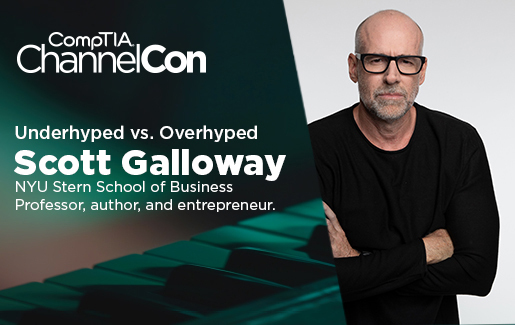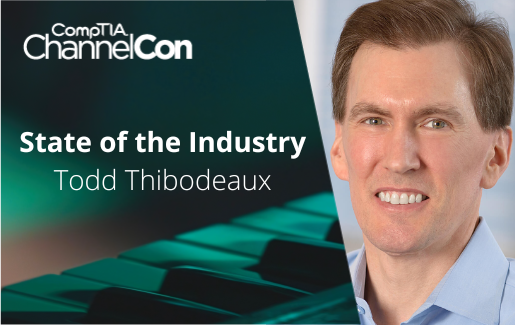
No one can say Scott Galloway is short on opinions—or of very loudly sharing said opinions—no matter how much criticism he gets or people he offends.
The author, speaker, professor, podcaster, TV host—just to name a few outlets for his pontifications—has gained a following because of his critiques of staid industries, companies and policies, Galloway shared his thoughts on overhyped and underhyped trends in technology at CompTIA’s ChannelCon conference in Chicago.
In a rapid-fire presentation (nearly 160 slides in 60 minutes), Galloway let loose on the current state of the health care industry, spiraling costs of education and its impact on the workforce, Web3, and much more.
“I’m a narrative vs. numbers guy,” he said, noting that too much often gets made of the latest trends. It’s either the biggest thing ever or it’s going to collapse society. “Nobody ever says, ‘this will make the world marginally better.’ You just don’t hear that.”
Here’s a look at some tech-related industries and what Galloway thinks should happen—and shouldn’t:
Health Care: Telehealth is a Long-Overdue Disruptor
Health care has become a $4 trillion business (“every other industry is small by comparison”) but it has reached an unsustainable model where consumer prices keep increasing while the level of service continues to decline. Telehealth is providing some much-needed relief, offering new choices and opportunities for patients and providers.
“This is an incredibly exciting time at the intersection of technology and health care. When I talk to my students [at NYU’s Stern School of Business] about careers and industries to go into, all things being equal, I tell them to go into health care,” Galloway said.
Funding has doubled in telehealth in recent memory and one of the more disruptive events of the last couple years has been Amazon acquiring One Medical.
“The market expects Amazon to grow by double-digits every year, which means they have to add $250 billion in top-line revenue over the next five years. Can you imagine that? That means there’s really only a small number of industries they can go into to reach that scale. Health care is one. It’s the same reason Apple is going into automobiles—there are only a few industries that size,” he said.
Education: Certifications, Training Will Level the Playing Field
When Galloway applied to UCLA as a teenager in the 1980s, 74% of students were accepted. Last year, that number was 12% and this year it was 6%, he said. And keep in mind that it’s the “best and brightest” students applying to the university in the first place.
“We need to get rid of the notion of exclusion. How many of you think you would never get into the school you went to if you applied now?” he asked ChannelCon attendees. “If that’s you, that means your daughter or son is going to think that too.”
Higher education has been ripe for disruption for several years as tuition costs have escalated and acceptance rates have dropped.
“The best business model is not to enter into a rejectionist mindset. It’s like ‘How can I make more money and be less accountable?’ That strategy is creating a false scarcity. People are paying 90 to 95 points gross margin. It’s terrible. It’s bad for America. It needs to stop,” he said. “You can’t decide that you don’t want single mothers or Black and Latino groups. It’s inherently the wrong move to decide certain cohorts aren’t going to have same advantage.”
An answer to the “Hermesification” of education is to rely more on alternative platforms such as certifications and job training initiatives to get workers trained and hired.
“Companies are increasing their positions with non-traditional certifications. The best thing to help commonwealth is to stop the fetishization of the elite. We need more onramps even if they don’t have a traditional four-year degree,” he said.
Web3: The Metaverse Is Hear, Not Here
Galloway doesn’t have much use for the metaverse, especially the one constructed by an oft target of his criticism, Mark Zuckerberg. Likewise, he bemoans the “decentralization” messaging of cryptocurrencies when 2% of Bitcoin accounts control 95% of the market.
“Everyone talks about the ‘economic freedom’ that unloads you from the tyranny of banks. Except that they do step in and tell you what you can or can’t do,” he said.
But he’s not against Web3 for the sake of being against Web3. A truly meaningful metaverse is possible and required components should include ubiquitous devices, trust, capital, payments, and programming skills. Apple is currently the one company that meets his requirements and AirPods, which he jokingly called $300 earrings, are the one product driving the charge.
“It’s the only wearable that’s actually wearable,” he said, noting that if revenue from Apple’s AirPods were a separate business, it would be a Fortune 200 company.
“The metaverse is going to be more about your ears than your eyes,” he said, noting that the people who approach him thinking he’s already their friend are those who listen to his podcast, not those reading his books or watching him on TV.
“When you’re in someone’s ear and they hear your voice, they begin to believe you are friends. It’s an intimate medium. Audio is underexploited. It’s a closer bond,” he said.
To wrap, Galloway noted that he is often asked what profound opportunities exist in the market. He told attendees to ask themselves three questions, none of which necessarily relate to technology, but could also be applied to business relationships:
- Is it time for you to become parents’ caregiver?
- Do you have relationship you want to with your siblings?
- Have you invested in friendships?
“Every study in happiness talks about the deep relationships you have are important. The pandemic has offered us the time to repair and cement those relationships. That’s a profound opportunity,” he said.

 Add CompTIA to your favorite RSS reader
Add CompTIA to your favorite RSS reader

